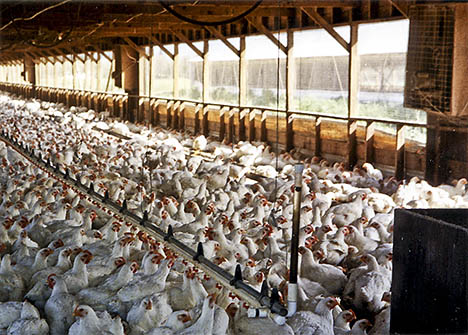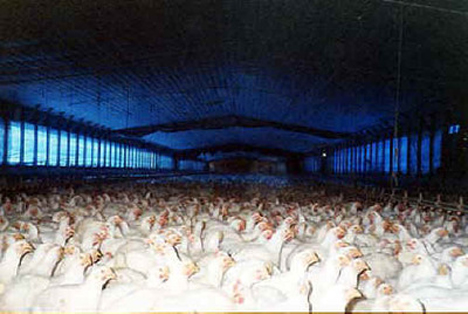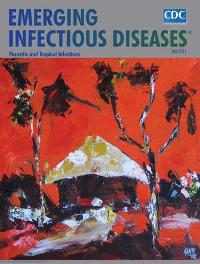Abuse of Antibiotics in Agroindustry Generates Deadly Drug-Resistant Bacteria | Antibióticos en la agroindustria generan bacterias resistentes
Editorial Comment
The situation described below, where antibiotics are abused so as to confine animals to unnaturally small spaces, is generally true of agroindustrial farms throughout the world. Indeed, more antibiotics are released into streams, rivers, lakes, kitchens, and hospitals by this route than any other means. By contrast to the avian flu scares that were manufactured, the release of highly resistant bacteria from industrial poultry farms is a genuine threat to health.
Dady Chery, Editor
Haiti Chery
Antibiotics toughen bacteria on German farms
By Julio Godoy
IPS
English | Spanish
Berlin, Germany — The recent death of five prematurely born children in the northern German city Bremen as a result of infections acquired in the hospital has strengthened fears among environmental and health experts that massive use of antibiotics in industrial livestock farming is creating extremely resistant bacteria.
 The children who died last December and earlier this year in Bremen, some 300 kilometres west of Berlin, were victims of infections with highly resistant bacteria, including the extended-spectrum beta-lactamase (ESBL). Similar infections have been detected in other hospitals in Germany, though these were not fatal.
The children who died last December and earlier this year in Bremen, some 300 kilometres west of Berlin, were victims of infections with highly resistant bacteria, including the extended-spectrum beta-lactamase (ESBL). Similar infections have been detected in other hospitals in Germany, though these were not fatal.
The cases have raised renewed questions about lack of hygiene in German livestock farming, especially in industrial poultry farms, where thousands of animals are held in relatively small spaces.
The bacteria are believed to have been inadvertently brought into clinics by patients who had been in contact with contaminated poultry.
“Three days after the birth, the doctors announced to us that our baby had contracted an infection and was very ill, and could die,”
Maik Stefens, father of a prematurely born infant at the clinic in Bremen told IPS.
“The doctors said bacteria in poultry was the most likely cause of the infection,” Stefens said.
“Abuse of antibiotics in livestock farming was the actual origin of the problem.”
Stefens’s baby Niclas survived, but five infants died of similar infections.
In December, the death of three prematurely born infants forced local health authorities to launch an intensive investigation into hygiene conditions at the clinic, and to then order its complete renovation. Additionally, personnel received a crash course in hygiene.
The clinic was opened again in February, to be closed for good early March after two new-born babies died of infections with highly resistant bacteria.
Clinical studies confirm that the genetic structure of the ESBL bacteria found in poultry sold in markets across Europe is identical to that of bacteria in the infections detected in humans.
Poultry bred in industrial livestock farms across Germany is widely treated with antibiotics, regardless of the animals’ health.
According to the Robert Koch institute (RKI), the German central federal health institution responsible for disease control and prevention, 90 percent of all chickens sold in the country contain ESBL germs.
ESBL are lethal enterobacteria resistant to most antibiotics. They were first detected in 1983 – in Germany, due precisely to industrial livestock farming.
A study by the government of the federal state North Rhine Westphalia confirmed that 96 percent of all chickens bred in the state have been treated with antibiotics. The treatment kills most germs, but contributes to the emergence of others resistant to antibiotics.
“My most pressing fear is that by abusing antibiotics, we are actually breeding highly dangerous bacteria,”
Wolfgang Witte, director of molecular diagnostics at the RKI told IPS.
Poultry farmers confirm that all animals at a farm are treated with antibiotics when one single animal shows symptoms of infection.
“Otherwise, I would run the risk of losing the whole farm,”
a farmer, who asked not to be identified, told IPS.
“This is a risk I cannot afford, I would go bankrupt.”
The antibiotics are administered through drinking water to the population of the whole farm.
Such use of antibiotics has led to a high concentration of chemicals and of germs flowing into rivers with recycled sewage and wastewater. Bacteria and antibiotics have also been found in fields close to industrial livestock farms.
Reinhild Benning of the German environmental organisation BUND told IPS that many samples raised around a farm in an experiment last month contained ESBL germs.
“The whole village near the farm is afraid of the infections,”
said Friedrich Ehlers who lives in the neighbourhood of the farm.
“We smell the stench of the farm and breathe the emissions every day.”
The problem goes beyond the presence of antibiotics and germs in the atmosphere. When contaminated meat is cooked at home, the germs do get killed. But it is likely that germs can pass to other foods like vegetables, which if eaten raw or only lightly cooked, can lead to infections.
Additionally, residues of poultry and other livestock industrial farms are recycled as fertilisers for agriculture. Such recycling spreads both germs and antibiotics, and brings them into the human chain food, even for people who avoid industrial livestock and prefer organic foodstuffs.
“This is such a scandal that we now cannot trust our own food,”
Beate Stefens, mother of the infected child in Bremen, told IPS.
This is not the first food scandal in Germany. Last summer, 53 people died and more than 4,000 became ill as a result of infections caused by vegetables contaminated with Escherichia coli.
VIDEO: Chicken farm (courtesy of geomooful, 2 1/2 min).
Source: IPS
Antibióticos en la agroindustria generan bacterias resistentes
Por Julio Godoy
IPS
inglés | español
BERLÍN — La muerte de cinco bebés prematuros en la norteña ciudad alemana de Bremen, infectados por una bacteria aviar contraída en un hospital, aumenta el temor de ambientalistas y expertos en salud de que el uso generalizado de antibióticos en el sector agropecuario genere gérmenes extremadamente resistentes.

 Los bebés prematuros, que murieron en diciembre y a principios de este año en Bremen, 300 kilómetros al oeste de Berlín, se infectaron con una bacteria altamente resistente debido a que produce la enzima betalactamasa de espectro extendido (BLEE).
Los bebés prematuros, que murieron en diciembre y a principios de este año en Bremen, 300 kilómetros al oeste de Berlín, se infectaron con una bacteria altamente resistente debido a que produce la enzima betalactamasa de espectro extendido (BLEE).
Se detectaron infecciones similares en otros hospitales de Alemania, aunque no se registraron casos fatales.
Estos incidentes pusieron otra vez sobre el tapete el problema de la falta de higiene en el sector agropecuario, en especial en las avícolas, donde tienen a miles de animales confinados en espacios reducidos.
Se cree que la bacteria llegó a los hospitales portada de forma involuntaria por pacientes, que estuvieron en contacto con aves contaminadas.
El padre de un bebé prematuro nacido en la clínica de Bremen contó la difícil situación que les tocó vivir.
“Tres días después de su nacimiento, los médicos nos dijeron que nuestro había tenía una infección, que estaba muy enfermo y que podía morir”,
dijo Maik Stefens a IPS.
“Los médicos dijeron que la bacteria de las aves era la causan más probable de la infección”, apuntó.
“El abuso de antibióticos en los criaderos fue el verdadero origen del problema”, añadió.
El bebé de Stefens, Niclas, sobrevivió, pero otros cinco recién nacidos prematuros con infecciones similares no tuvieron la misma suerte.
La muerte de tres bebés prematuros en diciembre obligó a las autoridades sanitarias a lanzar una investigación exhaustiva sobre las condiciones de higiene de la clínica, tras lo cual ordenaron su completa renovación. Además, el personal recibió un curso intensivo de higiene.
La clínica fue reabierta en febrero, pero cerrada definitivamente a principios de este mes tras la muerte de dos recién nacidos infectados con la misma bacteria altamente resistente.
Análisis clínicos han confirmado que la estructura genética de la BLEE, identificada en aves comercializadas en Europa, es idéntica a la detectada en humanos infectados.
En las granjas industriales de Alemania, las crías reciben antibióticos de forma indiscriminada, y sin importar su situación sanitaria.
Según el Instituto Robert Koch (IRK, por sus siglas en alemán), responsable del control y prevención de enfermedades de Alemania, 90 por ciento de los pollos vendidos en este país contienen la enzima letal.
La BLEE es resistente a la mayoría de los antibióticos. Fue detectada por primera vez en 1983 en Alemania, precisamente por la industria avícola.
Un estudio realizado por el gobierno del estado occidental de Renania Norte-Westfalia confirmó que 96 por ciento de los pollos del estado habían recibido antibióticos. El tratamiento mata a la mayoría de los gérmenes, pero favorece la emergencia de otros resistentes a los medicamentos.
“Mi mayor temor es que al abusar de los antibióticos terminamos, de hecho, cultivando bacterias altamente peligrosas”,
dijo a IPS el director de diagnóstico molecular de RKI, Wolfgang Witte.
Los avicultores confirmaron que apenas detectan señales de infección en un animal, administran antibióticos a todos.
“De lo contrario corro el riesgo de perder toda la granja”,
dijo a IPS un granjero que pidió no ser identificado.
“No puedo correr el riesgo, me fundo”, admitió.
Los antibióticos se administran a través del agua potable. Este sistema llevó a que se encontrara una alta concentración de químicos y gérmenes en los ríos, debido al tratamiento del agua cloacal y residual. También se encontraron bacterias y antibióticos en los campos vecinos a las granjas industriales.
Reinhild Benning, de la organización ambientalista BUND, dijo a IPS que muchas muestras recolectas en febrero en el entorno de una avícola en el marco de un experimento contenían BLEE.
“Todo el pueblo tiene miedo de las infecciones”,
señaló Friedrich Ehlers, un vecino de una avícola.
“Sentimos el hedor de la granja y respiramos sus emisiones todos los días”, apuntó.
Pero el problema no es solo la presencia de antibióticos y gérmenes en la atmósfera. Cuando la gente cocina la carne contaminada mata los gérmenes. Pero es probable que estos hayan pasado a otros alimentos, como las verduras, que si se comen crudos o apenas cocidos, provocan una infección.
Además, los restos de aves y ganado vacuno se reciclan como fertilizantes para la agricultura. Este sistema propaga gérmenes y antibióticos, que terminan en la cadena alimentaria humana, incluso para aquellas personas que evitan los productos industriales y solo consumen alimentos orgánicos.
“Es tal el escándalo que ya no podemos confiar en nuestros propios alimentos”,
dijo a IPS la madre del bebé infectado en Bremen, Beate Stefens.
No es el primer escándalo de este tipo en Alemania. En el último verano boreal, 53 personas murieron y más de 4.000 enfermaron por comer verduras contaminadas con una cepa de Escherichia coli.
Se trata de una bacteria que se encuentra en el intestino de los animales y, por lo tanto, en aguas cloacales, y que es capaz de crear una toxina que causa enfermedades graves.
Fuente: IPS







Comments
Abuse of Antibiotics in Agroindustry Generates Deadly Drug-Resistant Bacteria | Antibióticos en la agroindustria generan bacterias resistentes — No Comments